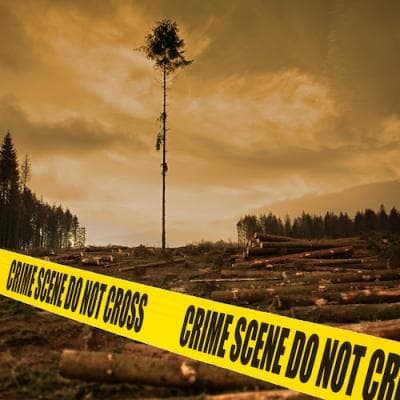REPORT: PNG Forestry laws insufficient to combat forest crime

Image: Greenpeace
The Forestry Act and other parts of the forestry law framework in Papua New Guinea are insufficient to combat widespread illegal logging and forest crime.
Therefore, greater emphasis needs to be placed on using criminal law sanctions, both in PNG and internationally, to tackle the illegal destruction of forest resources and the economic, social and environmental harm it causes.
These are the key findings in a new report authored by Dr Hannah Harris from the Macquarie University Law School in Sydney, Australia and commissioned by community advocacy group ACT NOW!
Illegal logging and forest crime have long been recognised as significant challenges impeding development in PNG. They are able to flourish, says the report, because the existing legal framework fails to acknowledge to address the role of local and international criminal actors in facilitating illegal logging.
There is also a failure by forest authorities to utilise the existing enforcement mechanisms under the Forestry Act and a complete lack of transparency around monitoring and enforcement of forestry laws.
These failures are exacerbated by a lack of oversight of administrative and enforcement actions by the PNG Forest Authority and the potential conflict of interest created by the desire to generate government revenue from the forestry sector.
The report finds that in order to effectively tackle illegal logging and forest crime in PNG authorities need to look beyond the forestry law framework and there needs to be greater use made of the criminal law framework, both in PNG and internationally.
The criminal activities most strongly associated with forest crime are corruption, money-laundering and tax evasion.
This means the newly created Independent Commission Against Corruption, the Bank of PNG and its Financial Analysis and Supervision Unit, and the Internal Revenue Commission all have vitally important roles to play in combatting forest crime.
Other offences under the Criminal Code that are strongly linked with illegal logging and forest crime include smuggling, stealing and acts of violence. Greater use of these tools by the Royal Papua New Guinea Constabulary could strengthen enforcement action against illegal activity in the forestry sector, but there are critical gaps in the capacity and resourcing of the police force.
The report also highlights the role of transnational corporations and criminal enterprises in facilitating illegal logging and forest crime in PNG. This creates a need for enforcement of criminal laws both against individuals (natural persons) and corporations (legal persons) and for the engagement of international law enforcement agencies and multilateral organisations in targeted law enforcement.
The international stakeholders that need to be engaged to combat illegal logging and forest crime in PNG include foreign enforcement bodies responsible for anti-corruption, money-laundering and tax law regimes in jurisdictions exposed to illicit flows of timber and money originating in PNG; transnational businesses in the forestry, agriculture, finance, and professional service sectors; and international agencies concerned with combating financial and environmental crime.
The report recommends increased use of criminal law tools to combat illegal logging and forest crime in PNG with an emphasis on corruption, money laundering and tax-evasion.
It also says there needs to be increased transparency and accountability in the administration and enforcement of forestry laws, and greater collaboration with transnational stakeholders including foreign law enforcement bodies, transnational business and international agencies in detection, investigation and enforcement of transnational criminal law mechanisms.
The report also makes some specific recommendations for further research to advance knowledge of the important relationships between different areas of law, practice and enforcement practice that could be valuable in supporting efforts to combat illegal logging and forest crime in PNG.
Download the report: Illegal Logging and the Criminal Law Context in Papua New Guinea (1.6mb)
